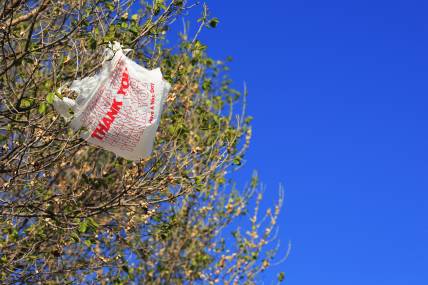Chicago's Disposable-Bag Tax is Working, Study Finds

While a New York City local law to establish a 5-cent tax on plastic checkout bags at grocery stores was blocked in Albany in February, a 7-cent tax implemented Feb. 1 by Chicago led to a “dramatic decrease” in grocery store shoppers’ use of disposable carryout bags there, according to a study led by Professor Tatiana A. Homonoff of NYU Wagner.
The findings, from a joint study by Homonoff, ideas42 (a research organization), and the University of Chicago’s Energy and Environment Lab, indicate that after the City of Chicago implemented its tax on both paper and plastic checkout bags, less than half of shoppers continued to use a disposable bag—a 32 percentage point drop.
In addition, the customers who continued to rely on disposable bags at the store checkout actually used fewer of them. As a result, the average number of disposable bags per shopping trip dropped by about one bag per trip, a 42 percent drop in total bags used.

“Results from this study show that Chicago’s bag tax led to a dramatic decrease in disposable bag use,” said Homonoff, assistant professor of economics and public policy.
The independent study was commissioned by the Mayor’s Office in Chicago to assess the early impact of the new law, which, like New York’s unavailing measure, was established mainly for purpose of environmental protection.
Chicago’s 7-cent bag tax replaced an unsuccessful 2015 city ban on plastic carryout bags at large grocery chains. However, the 2015 ban was not applicable to thicker plastic bags, and many stores simply started to use them instead. “There was no strong cue for shoppers to change their behavior,” explains Professor Homonoff.
Previous research has shown that offering financial rewards to shoppers for using reusable bags are ineffective.
“In contrast,” Professor Homonoff remarks, “disposable bag taxes have been shown to have a significant behavioral impact. For example, a 5-cent tax on disposable paper and plastic bags in the Washington, D.C. area led to a 50 percent decrease in disposable bag use.”
The success the bag tax is consistent the concept in behavioral economics of “loss aversion.” It holds that individuals experience losses (such as taxes) more strongly than they do gains (such as discounts) of the same amount.